translation practice 2
- 格式:doc
- 大小:12.50 KB
- 文档页数:1
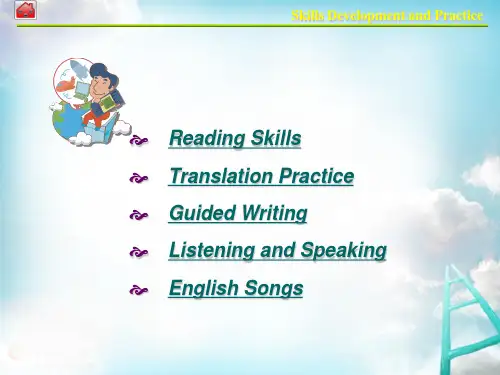
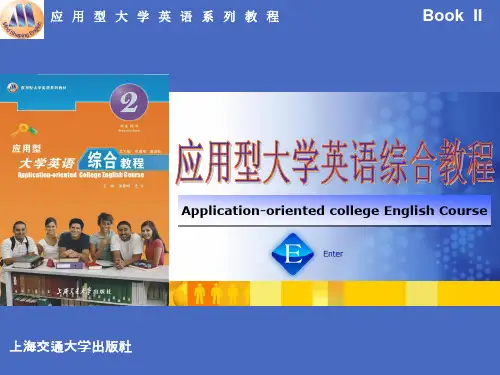
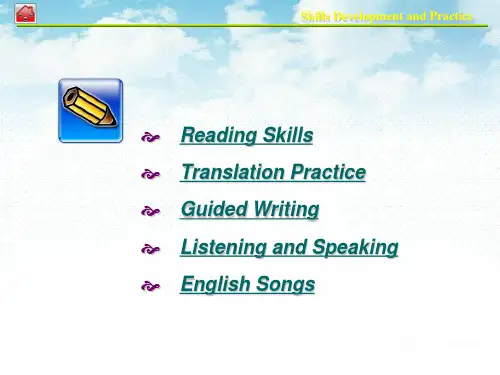
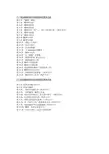
一.英汉翻译理论与实践课程之教案目录第1讲“翻译”溯源第2讲翻译的本质第3讲翻译的标准第4讲翻译面面观第5讲翻译必有“失”/ 失于此而得于彼(两讲合并)第6讲翻译与联想第7讲翻译与语法第8讲翻译与语体第9讲翻译与语篇第10讲英汉十大差异第11讲形合与意合第12讲代词的困惑第13讲Connotation的翻译第14讲翻译与词典第15讲以“模糊”求精确第16讲落笔知轻重译文讲分寸第17讲翻译最难是口吻第18讲翻译与形象思维第19讲翻译与灵感思维第20讲英语修辞的翻译(包括连接三讲)第21讲翻译中的文化冲击第22讲思维是语言的脊梁(两讲合并)第23讲翻译美学之思考(两讲合并)二.汉英翻译理论与实践课程之教案目录第1讲汉译英呼唤文字功力第2讲语篇与翻译第3讲:英汉语美感比读(两讲合并)第4讲:理性概译:翻译之坦途第5讲:英语句式的亮点:非人称主语句(两讲合并)第6讲:汉译英有用的句型(两讲合并)第7讲:类析汉译英常见拙译(三讲合并)第8讲:从“湖光山色”的英译说开去(两讲合并)第9讲:Denotation和Connotation(两讲合并)第10讲:翻译,你的本质是什么?第11讲:归化与异化----汉语习语的英译一.英汉翻译理论与实践课程之练习第1讲“翻译”溯源试将下列文字译成汉语:1/ Translation consists in reproducing in the receptor language the closest natural equivalent of the source language, first in terms of meaning and secondly in terms of style. (Eugene A. Nida & Charles R. Taber: The Theory and Practice of Translation, 1969)2/ Translation may be defined as follows:The replacement of textual material in one language (SL) by equivalent textual material in another language (TL)3/ A translation should give a complete transcript of the ideas of the original work. The style and manner of writing should be of the same character as that of the original. A translation should have all the ease of the original composition. (A. F. Tytler: Essay on the Principles of Translation. 1791)参考译文1/ 所谓翻译,是在译语中用最切近的自然的对等语再现原语的信息,首先是意义,其次是文体。
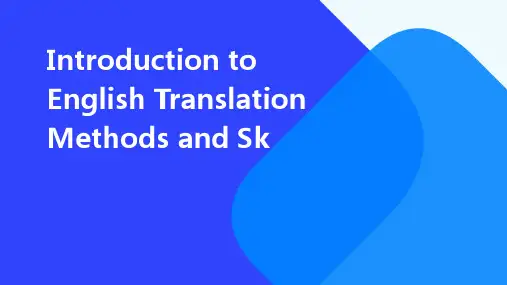
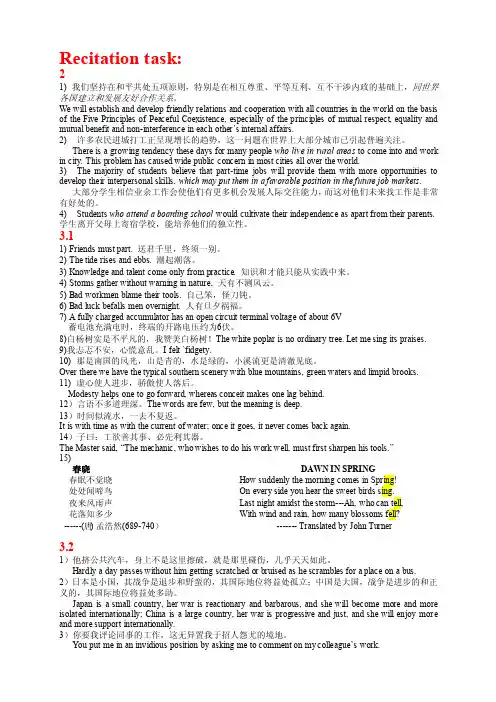
Recitation task:21)我们坚持在和平共处五项原则,特别是在相互尊重、平等互利、互不干涉内政的基础上,同世界各国建立和发展友好合作关系。
We will establish and develop friendly relations and cooperation with all countries in the world on the basis of the Five Principles of Peaceful Coexistence, especially of the principles of mutual respect, equality and mutual benefit and non-interference in each other’s internal affairs.2)许多农民进城打工正呈现增长的趋势,这一问题在世界上大部分城市已引起普遍关注。
There is a growing tendency these days for many people who live in rural areas to come into and work in city. This problem has caused wide public concern in most cities all over the world.3) The majority of students believe that part-time jobs will provide them with more opportunities to develop their interpersonal skills, which may put them in a favorable position in the future job markets.大部分学生相信业余工作会使他们有更多机会发展人际交往能力,而这对他们未来找工作是非常有好处的。
![dnbjkrq新编_大学英语第二册课后答案[1]](https://uimg.taocdn.com/53cdb001de80d4d8d15a4fa5.webp)
^| You have to believe, there is a way. The ancients said:" the kingdom of heaven is trying to enter". Only when the reluctant step by step to go to it 's time, must be managed to get one step down, only have struggled to achieve it.-- Guo Ge TechUnit 1●Part Two Reading centered activitiesPre-readingReading Comprehension1.Understanding the structure of the passagePara.1-4 c para.5-7 a para.8-11 b para.12-13 d2. 1) They would stare at them.2) He felt embarrassed/ ashamed3) He never let on.4) He usually walked there with the help of his son5) He was pulled on a child’s sleigh to the subway station6) He like basketball, dances, and parties7) He asked them to sit down and fight with him.8) He was proud of his son9) He missed him very much and was sorry for what he had thought about him.10) He learned to have a good heart from his father.3. 1) C 2) A 3) C 4) B 5) D 6) A 7) B 8)C 9)D 10) A4. Understanding the reference Words.1)the difficulty in coordination the steps2)whether a person has a good heart3) a good heart4)the baseball team5)sat down to fight6)what the son has achieved7)sensed8)the reluctance to walk with him●Vocabulary1. 1) urged2) halted3) bother4) embarrassed5) adjusted6) complain7) kid8)engage9)subject10)saw to it that11)coordinate12)participate2.Word-buildingpatiencebitternessfortuneknowledgeablereluctantentrancecomplaintenviousmemorablefrustration1)bitter2)fortunate3)patience4)memorable5)reluctant6)entrance7)complaints8)envious9)knowledgeable10)frustration●Translation1.He walks slowly because of his bad leg.2.He came to the meeting despite his serious illness.3.He saw to it that the same mistake didn’t happen again.4.Now that they’ve got to know each other a little better, the get along jus t fine.5.Then I found myself surrounded by half a dozen boys.6.I send you my best wishes on this happy occasion.●Part Three Further development3.What is love?1)causes2)offers3)to4)not5)tell6)calls7)attracted8)discovers9)weak10)disappointed11)distance12)out●Part Four Writing and Translation2. Translation Practice1.From Chinese into English1)support a big family2)care for her children and parents3)pay for his children’s education4)after years of diligent research5)the financial burden on his shoulders6)She has a golden heart/ a heart of gold and loves people around her.7)My father has never bought any toys and candies for my younger brother andme, but I know he loves us.8)My parents do their best to meet our needs and always keep their promises. 2.From English into Chinese1)他从来不感到疲劳,非常喜欢干活,而且说话不多。
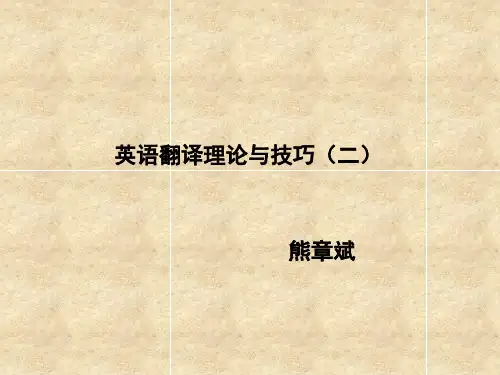
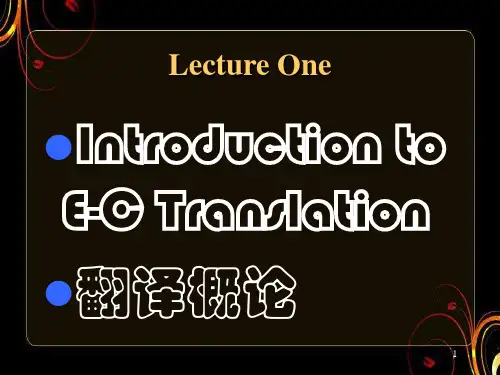

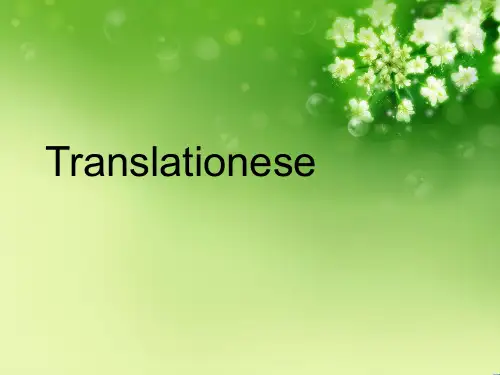
翻译练习将简单的句子进行中英文互译Translation Exercise: Translating Simple Sentences between Chinese and EnglishIntroduction:Translation is the process of conveying the meaning of one language into another. It plays a crucial role in facilitating communication between different cultures and nations. In this article, we will practice translating simple sentences from Chinese to English and vice versa. This exercise aims to improve our proficiency in both languages and enhance our understanding of language structure and cultural nuances.Section 1: Chinese to English Translation1. 你好吗?How are you?2. 我很高兴见到你。
I am glad to meet you.3. 他是我的朋友。
He is my friend.4. 这是一本好书。
This is a good book.5. 你明天有时间吗?Are you available tomorrow?Section 2: English to Chinese Translation 1. How old are you?你几岁了?2. I like to travel.我喜欢旅行。
3. Can you speak Chinese?你会说中文吗?4. Where is the nearest restroom?最近的洗手间在哪里?5. What is your favorite color?你最喜欢的颜色是什么?Section 3: Chinese to English Translation 1. 今天天气很好。
Translation PracticeDirections: Complete the sentences by translating into English the Chinese given in the brackets. Please write your translation on Answer Sheet 2.1.Soon after he transferred to the new school, Ali found that hehad_______________________________(很难跟上班上的同学) in Math and English.2.If she had returned an hour earlier, May____________________(就不会被大雨淋了)。
3.It is said that those who are stressed or working overtimeare______________ (更有可能增加体重)。
4.______________(很多人所没有意识到的)is that Simon is alover of sports, and football in particular.5.The study shows that the poor functioning of the human body is__________________ (与缺乏锻炼有关)。
6.I get along with my parents very well, because they never try to____________________(把他们的愿望强加于我)。
7.When you come next year, you will find that_________________(我们的服务质量会有很大的改善)。
翻译理论与实践(汉译英)Translation Theories and Practice (Chinese-English Translation )Teaching Notes for Senior College Students(2005年9月)刘国忠2578706*************.cnTopics at first:1. 解读汉译英《教学大纲》2. 解读汉译英《考试大纲》3. 汉译英学习指导①重要性②特性③实践性汉译英精典教材:1. 《英汉翻译教程》张培基喻天根《汉英翻译教程》吕瑞昌喻天根上海外语教育出版社 1980.92.《汉英翻译基础》陈宏薇上海外语教育出版社 1998/23.《英汉互译实用教程》宋天锡等国防工业出版社2000/14.《实用翻译教程》(英汉互译)增订本冯庆华上海外语教育出版社2002/55.《实用汉英翻译教程》曾诚外语教学与研究出版社2002/46.《翻译教学:实务与理论》刘宓庆中国对外翻译出版公司2003/1•汉译英主要内容:•一、汉译英实务教学•二、历届TEM8汉译英试卷评析•三、汉译英练习与评析•—汉英翻译强化训练汉译英实务教学主要内容一、汉英词语对比二、汉英句法基本差异(一)汉英句子的主语比较三、汉英句法基本差异(二)汉语谓语动词的分析和翻译四、被动语态的翻译五、汉译英中的主谓定位六、汉译英中的句子整合问题增补内容:七、如何避免翻译中的Chinglish八、汉英翻译中的文化传递九、公示语的翻译十、历届TEM8汉译英试卷评析十一、汉译英练习与评析—汉英翻译强化训练汉译英学习指导(一)如何保证翻译课的教学效果1.以―正当程序‖保证翻译质量无论英译汉,还是汉译英,译文都需要准确、通顺,这是翻译的基本要求。
表达准确的基础是对原文的准确理解:译者必须准确地理解原文的每个词、每句话和作者的意图。
表达通顺的基础是对译入语的熟练运用。
我们在做汉译英时,存在一个天然的劣势:由于英语不是我们的母语,做到表达的准确和通顺相当困难。
Sentence Translation Practice1.It is inevitable for the old to have generation gap with their children.对老年人来说,和他们的孩子有代沟是不可避免的。
2.It is sagacious that all relevant factors should be taken into account before taking anyaction.在采取任何行动之前,应该考虑所有相关的因素,这是明智之举。
3. A fear has arisen among some people that the more machines will be used, the moreworkers will be unemployed and the lower our living standard will become.恐惧在一些人当中出现了。
那就是,机器用得越多,失业的工人就越多,而我们的生活水平就会越低。
4.Before airing my opinion, I will analyze the hot issue from diverse perspectives.在表明观点之前,我将从不从的角度来分析这个热门话题。
5.As soon as a child becomes old enough to communicate with other children, he beginshaving friends, who sometimes influence him more rapidly than his family.当一个孩子长到足以和其他人交流时,他便开始交朋友,这些朋友对他的影响有时比家庭更快6.They spend too much time in front of the television, ignoring their study, outdooractivities and even their families.他们在电视机前面花费了太多的时间,忽略了学习、户外活动,甚至他们的家庭。
狮舞(Lion Dance)是中国最广为流传的民间舞蹈之一。狮为百兽之首,在中国传统中,狮
子被视为是能带来好运的吉祥物(mascot)。古人将狮子视作是勇敢和力量的化身,能驱赶
邪恶、保护人类。据记载,狮舞已拥有了2,000多年的历史。在唐代(the Tang Dynasty),
狮舞就已经被引入了皇室。因此,舞狮成为元宵节(the Lantern Festival)和其他节日的习俗,
人们以此来祈祷好运、平安和幸福。
The Lion Dance is one of the most widespread fork dances in China. The lion is the king of all
animals and in Chinese tradition it is considered/regarded as a mascot which can bring good luck.
Ancient people regarded the lion as a symbol of braveness and strength which could drive away
evil and protect humans. The dance has a recorded history of more than 2,000 years. During the
Tang Dynasty, the Lion Dance was already introduced into the royal family. Therefore, performing
the lion dance at the Lantern Festival and other festive occasions became a custom where people
could pray for good luck, safety and happiness.